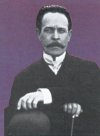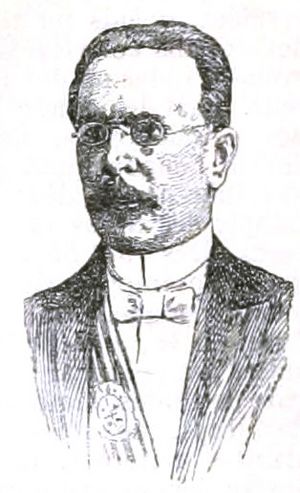Claudio Williman facts for kids
Quick facts for kids
Claudio Wílliman
|
|
|---|---|

Claudio Wílliman
|
|
| 20th President of Uruguay | |
| In office 1 March 1907 – 1 March 1911 |
|
| Preceded by | José Batlle y Ordóñez |
| Succeeded by | José Batlle y Ordóñez |
| Personal details | |
| Born | October 10, 1861 Montevideo, Uruguay |
| Died | February 9, 1934 (aged 72) Montevideo, Uruguay |
| Political party | Colorado Party |
| Profession | Lawyer |
Claudio Wílliman Gonzalez (born October 10, 1861, in Montevideo – died February 9, 1934, in Montevideo) was an important political leader in Uruguay. He served as the 20th President of Uruguay from 1907 to 1911. Wílliman was a member of the Colorado Party and worked closely with another famous president, José Batlle y Ordóñez.
Contents
Who Was Claudio Wílliman?
Claudio Wílliman's parents, José Williman and Antonia González, were immigrants. They came to Uruguay from Galicia, Spain. His grandfather's family originally came from Savoy, France.
Wílliman was part of the Colorado Party in Uruguay. This party was known for its liberal ideas. He was a strong supporter and friend of President José Batlle y Ordóñez.
Claudio Wílliman's grandson, José Claudio Wílliman, also became a politician. He served in the Uruguayan Senate from 1985 to 1990.
Claudio Wílliman's Presidency (1907-1911)
Claudio Wílliman became president after José Batlle y Ordóñez's first term. The law at the time did not allow presidents to serve two terms in a row. So, Batlle chose Wílliman to take his place.
Wílliman promised to continue Batlle's policies. He wanted to help ordinary people and improve the country. He spoke about creating a new Ministry of Public Education. He also wanted a government office to help workers.
Key Achievements During His Term
During Wílliman's time as president, many important projects were approved:
- Help for Farmers: Farmers could get loans from the Banco de la República.
- Modernizing Agriculture: The Department of Livestock and Agriculture was updated.
- Protecting Wages: A law in 1908 protected pensions and wages from being taken away.
- New Laws: Many laws were passed about business, crime, and family matters. These included laws for conditional release of prisoners and absolute divorce. The death penalty was also ended.
- Public Health: The government worked to prevent diseases. They gave out posters with tips to avoid illnesses. Hygiene inspections were also started.
- Supporting Workers: A special Labor Office was created. Its job was to study industries and workers' needs. This office helped prepare new laws to improve working conditions. In 1907, the Ministry of Industry, Labor, and Public Instruction was formed.
- Military Pensions: In 1911, a fund was set up to provide pensions for military officers and their families.
- Education: Many new public schools were built, especially in rural areas. In 1908, a law created the National Institute for the Deaf.
- Public Works: Money was spent on improving cities and towns. This included building new roads, bridges, and sanitation systems. New buildings were constructed for schools, police, and the military.
Helping Families and Children
Wílliman's government also focused on helping families:
- Parental Authority: A law in 1911 set rules for losing and getting back parental authority. It also created the Council for the Protection of Minors.
- Maternity Care: A 1908 law recognized the right of mothers to good maternity care.
- School Health: The School Medical Corps was created in 1908. Doctors checked school buildings, teachers, and materials. They also worked to prevent infectious diseases among students.
- Public Assistance: In 1910, public assistance was reorganized. It meant that anyone who was poor or had no resources had the right to free help from the state. This included child protection, help for pregnant women, and care for homeless children and the elderly.
Worker Safety and Pensions
In 1908, a bill was proposed to help workers who got injured on the job. This bill said that employers were responsible for accidents that happened to their workers. It suggested pensions for workers who became unable to work due to injuries or death.
This bill was approved quickly by the Chamber of Deputies. However, it took a long time to pass in the Senate. It finally became law in 1920.
In 1910, the government also offered a pension plan for farm and factory workers. This plan was for those earning less than $300 a year. Later, in 1919, a law extended retirement pensions to employees in services like water, telephone, and railways.
After His Presidency
After his term, Claudio Wílliman was succeeded by José Batlle y Ordóñez, who was re-elected in 1911. Wílliman then returned to the Senate of Uruguay.
In 1916, he left the Senate to become the president of the Banco de la República Oriental del Uruguay. He held this important position until 1928.
Wílliman lived to see some of the democratic progress he and Batlle had worked for change. In 1933, President Gabriel Terra took more power in a coup d'état.
Death and Legacy
Claudio Wílliman passed away in 1934.
Today, two roads are named after him. One is in Punta del Este and another in Punta Carretas, honoring his contributions to Uruguay.
See also
 In Spanish: Claudio Williman para niños
In Spanish: Claudio Williman para niños
- Politics of Uruguay
- List of political families#Uruguay
 | Janet Taylor Pickett |
 | Synthia Saint James |
 | Howardena Pindell |
 | Faith Ringgold |


